初中新概念英语第一册 下半册Lesson 91-92 课件(共41张PPT)
文档属性
| 名称 | 初中新概念英语第一册 下半册Lesson 91-92 课件(共41张PPT) | 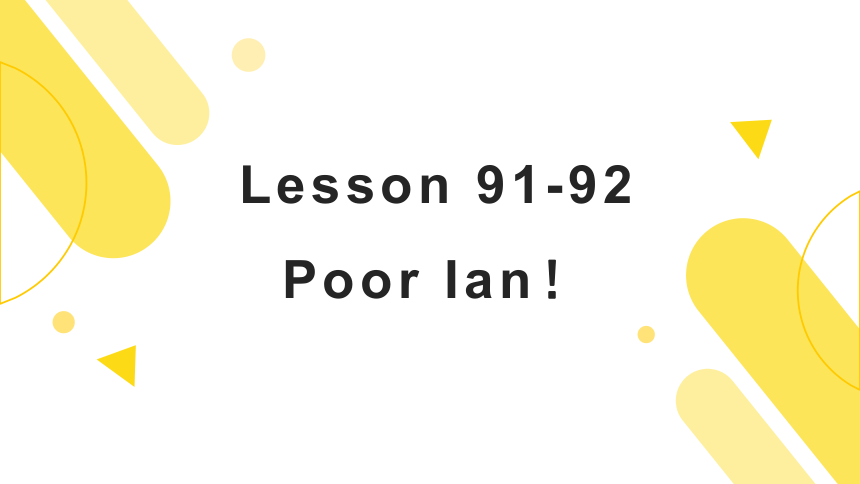 | |
| 格式 | pptx | ||
| 文件大小 | 815.6KB | ||
| 资源类型 | 教案 | ||
| 版本资源 | 新概念英语 | ||
| 科目 | 英语 | ||
| 更新时间 | 2024-01-06 08:44:39 | ||
图片预览


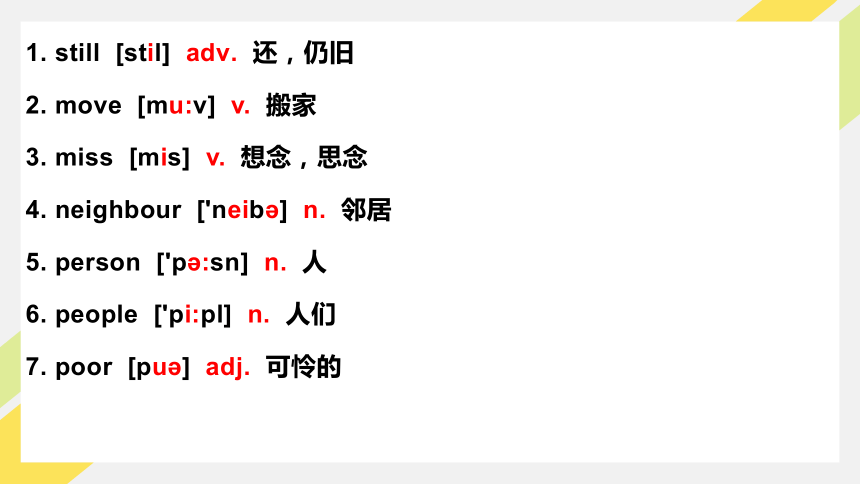


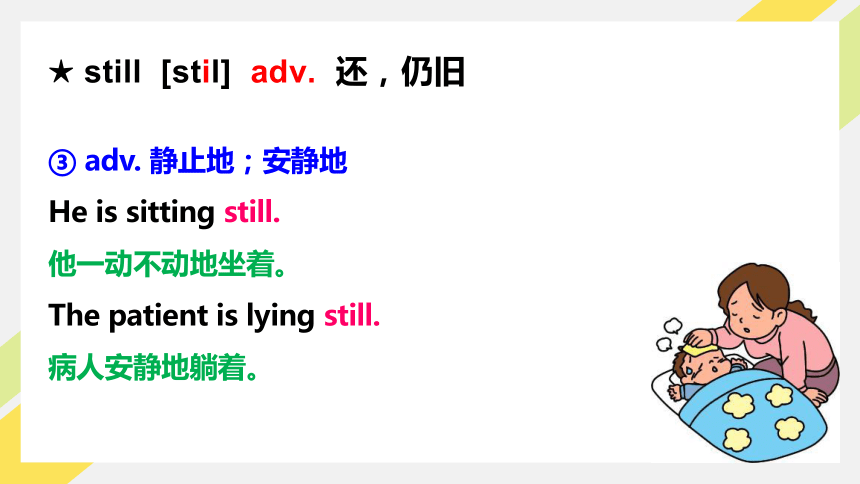

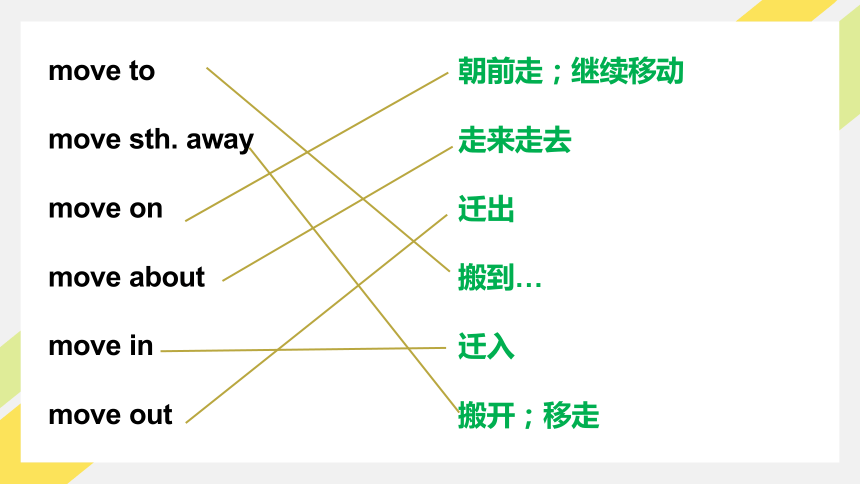

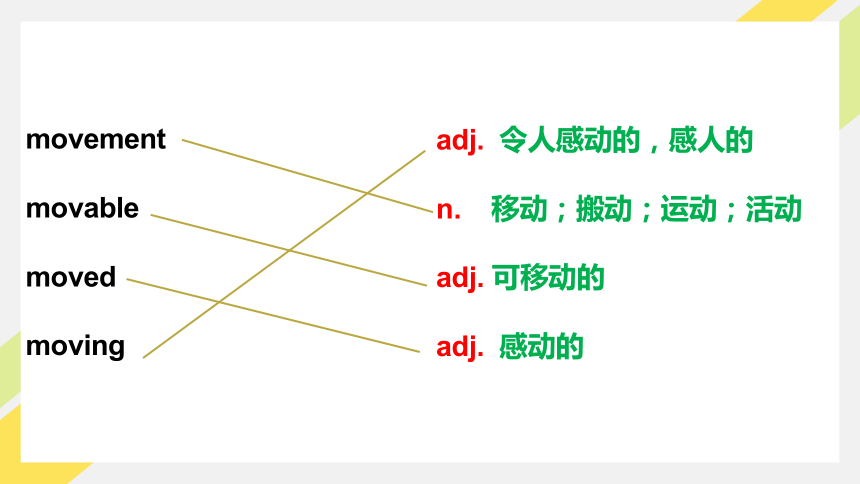


文档简介
(共41张PPT)
Lesson 91-92 Poor Ian!
New Words
1
1. still [stil] adv. 还,仍旧
2. move [mu:v] v. 搬家
3. miss [mis] v. 想念,思念
4. neighbour ['neib ] n. 邻居
5. person ['p :sn] n. 人
6. people ['pi:pl] n. 人们
7. poor [pu ] adj. 可怜的
① adv. 还是,仍然
I still can't decide where to go.
我还是不能决定去哪。
She was still beautiful at the age of 46.
她46岁时仍然美丽。
★ still [stil] adv. 还,仍旧
② adv. 还要,甚至更
She looked very ill last week and this week looks still worse.
她上周看起来病得很严重,这周更严重了。
★ still [stil] adv. 还,仍旧
③ adv. 静止地;安静地
He is sitting still.
他一动不动地坐着。
The patient is lying still.
病人安静地躺着。
★ still [stil] adv. 还,仍旧
① v. 搬家;移动
他们从南京搬到深圳。
They moved from Nanjing to Shenzhen.
★ move [mu:v] v. 搬家
move to
move sth. away
move on
move about
move in
move out
朝前走;继续移动
走来走去
迁出
搬到…
迁入
搬开;移走
②感动,打动
这个故事感动了我。
This story moved me.
The news moved him very much.
这消息使他很感动。
★ move [mu:v] v. 搬家
movement
movable
moved
moving
adj. 令人感动的,感人的
n. 移动;搬动;运动;活动
adj. 可移动的
adj. 感动的
① v. 想念,惦念
我想你。
I missed you.
★ miss [mis] v. 想念,思念
② v. 错过;未做到
He overslept and missed his train.
他睡过了头,错过了他那班火车。
★ miss [mis] v. 想念,思念
miss doing sth. 未能
I missed buying the magazine.
我未能买到那本杂志。
I missed seeing him yesterday.
昨天我未能/没看见他。
③注意到…的不存在
你什么时候发现提包不见的?
When did you miss your bag
Did we miss any other great ones
我们有没有遗漏其他很棒的东西?
★ miss [mis] v. 想念,思念
Where does your neighbour come from
你的邻居是什么地方的人?
★ neighbour ['neib ] n. 邻居
★ neighbourhood n.四邻,邻近地区
This is a quiet neighbourhood.
这一带很安静。
①He is a nice/good person.
他是个好人。
②in person 亲自,直接的
He will go to get the money in person.
他将亲自去取钱。
★ person ['p :sn] n. 人
★ personal adj. 个人的,私人的 ['p :s n l]
★ person ['p :sn] n. 人
That's my personal opinion.
那是我的个人观点。
It‘s a personal letter.
这是一封私人信件。
①n. 人们
街上有很多人。
There are a lot of people in the street.
the people 民众,人民,国民
②n. 民族
the English-speaking peoples
说英语的民族
★ people ['pi:pl] n. 人们
person 强调的个体的人,
可以有复数形式 persons
people 通常是人的统称,
单复数形式相同
person和people用法
①adj.可怜的
The poor old woman had no one to talk to.
那个可怜的老人找不到人跟她说话。
★ poor [pu ] adj. 可怜的
②贫穷的
反义词:rich
a poor man 贫穷的人
the poor 穷人
我们应该帮助穷人。
We should help the poor.
★ poor [pu ] adj. 可怜的
③笨拙的,差劲的
擅长于...
be good at sth./be good at doing sth.
不擅于…
be poor at sth./ be poor at doing sth.
★ poor [pu ] adj. 可怜的
still
move
miss neighbour person
people
poor
v. 想念,思念
n. 邻居
adv. 还,仍旧
v. 搬家
n. 人
adj. 可怜的
n. 人们
Text
2
1. Has Ian sold his house yet
Yes, he has. He sold it last week.
2. Has he moved to his new house yet
No, he hasn't.
3. When is he going to move
He is going to move tomorrow afternoon.
4. Is he a very nice person
Yes, he is.
Listen and Answer
CATHERING: Has Ian sold his house yet
JENNY: Yes, he has. He sold it last week.
★yet 己经(疑问句)
yet 还 ( 否定句)
already (肯定句)
My father has already come home form work.
我的父亲己经下班回到了家。
(already置于助动词与实义动词之间)
Has your father come home yet
你的父亲己经下班到家了吗?
(yet一般放在句末)
CATHERING: Has he moved to his new house yet
JENNY: No, not yet. He's still here. He's going to move tomorrow.
★move to 搬到…
我明天要搬到B区的办公室。
I'll move to the office in zone B tomorrow.
★ yet用于疑问句和否定句的句尾。
No, he has not moved to his new house yet.
★ He is still here.
副词still也可用于一般现在时, 注意位置在be动词之后。
Things can still get better.
情况还是会好转的。
★ be going to do 计划、打算做某事
一般指已经计划好的事情,而且是主语本身主动要做的事情
他今晚打算写封信。
He is going to write a letter tonight.
CATHERING: When Tomorrow morning
JENNY: No. Tomorrow afternoon. I'll miss him. He has always been a good neighbour.
LINDA: He's a very nice person. We'll all miss him.
★ miss
我很想家.
I miss home very much.
I miss you because I missed you.
我如此想念你,因为我们曾经彼此错过。
★ nice
表达人的人品很好可以用good或nice。
他是个好人。
He's a good guy.=He is a nice man.
all 在家,全部(指3个或3个以上的人或物)
They all like English.
他们所有的人都有喜欢英语。
both 都 (用来指2个人或物)
Both Mr. Smith and Miss Lee are from Brazil. Smith.
先生和李小姐都是巴西人。
CATHERING: When will the new people move into this house
JENNY: I think that they'll move in the day after tomorrow.
LINDA: Will you see Ian today, Jenny
JENNY: Yes, I will.
★ people = neighbours
She’s the right person for this job.
她是这个职位的合适人选。
★ move to = move into 搬进
★ the day after tomorrow 后天
the day after tomorrow in the morning
后天早上
the day after tomorrow in the afternoon
后天下午
the day after tomorrow in the evening
后天傍晚
the night after next
后天晚上
LINDA: Please give him my regards.
CATHERING: Poor Ian! He didn't want to leave this house.
JENNY: No, he didn't want to leave, but his wife did!
★ give sb. sth. = give sth. to sb.
给某人某物=把某物给某人
Please give your parents our regards.
Please give our regards to your parents.
请代我们问候你的父母。
★ poor adj. 可怜的
可怜的女孩
poor girl
★ poor adj. 贫穷的
贫穷的国家
the poor country
★ leave 离开
leave… for… 离开… 去…
When will you leave China for England
你什么时候离开中国去英国?
leave for 动 身去…
I will leave for England on September
23rd.
Grammar
3
① 一般将来时表示将来某一时刻的动作、状态以及打算。一般与表示将来意义的时间状语连用。
一般将来时
明天
本月
后天
下周
两天之后
从现在开始
将来
tomorrow
this month
the day after tomorrow
next week
in two days' time
from now on
in the future
② 一般将来时的形式:
主语 + will/shall + 动词原形
一般将来时
will用于所有人称
shall可用于第一人称 I 和 we
will表示说话人的意图和意愿
shall表示说话人的责任或决心
③ 一般疑问句是将助动词will/shall提前,否定是在will/shall的后面加not
一般将来时
否定缩写:
shall not = shan't
will not = won't
肯定句:
他下个星期来。
He will (He'll) come next week.
明天早饭我吃鸡蛋和烤面包。
I will (I'll) have eggs and toastfor breakfast tomorrow morning.
一般将来时
否定句:
他下周回不来。
He will not (won't) come back next week.
她今天下午不会去拜访她的朋友。
She will not (won't) go to visit her friend this afternoon.
一般将来时
一般疑问句:
你明天早晨会见他吗 (肯定回答)
- Will you see him tomorrow morning
- Yes, I will.
她后天会把信寄走吗?(否定回答)
- Will she post the letter the day after tomorrow
- No, she won't.
一般将来时
④ 除了will/shall外,还可以用其他方法表示将来时。在口语中,常用be going to do的结构。
一般将来时
■ 表示说话人的意思或打算
她打算乘飞机旅行。
She is going to travel by air.
表示有迹象某事即将发生
■ 要下雨了。
It is going to rain.
Lesson 91-92 Poor Ian!
New Words
1
1. still [stil] adv. 还,仍旧
2. move [mu:v] v. 搬家
3. miss [mis] v. 想念,思念
4. neighbour ['neib ] n. 邻居
5. person ['p :sn] n. 人
6. people ['pi:pl] n. 人们
7. poor [pu ] adj. 可怜的
① adv. 还是,仍然
I still can't decide where to go.
我还是不能决定去哪。
She was still beautiful at the age of 46.
她46岁时仍然美丽。
★ still [stil] adv. 还,仍旧
② adv. 还要,甚至更
She looked very ill last week and this week looks still worse.
她上周看起来病得很严重,这周更严重了。
★ still [stil] adv. 还,仍旧
③ adv. 静止地;安静地
He is sitting still.
他一动不动地坐着。
The patient is lying still.
病人安静地躺着。
★ still [stil] adv. 还,仍旧
① v. 搬家;移动
他们从南京搬到深圳。
They moved from Nanjing to Shenzhen.
★ move [mu:v] v. 搬家
move to
move sth. away
move on
move about
move in
move out
朝前走;继续移动
走来走去
迁出
搬到…
迁入
搬开;移走
②感动,打动
这个故事感动了我。
This story moved me.
The news moved him very much.
这消息使他很感动。
★ move [mu:v] v. 搬家
movement
movable
moved
moving
adj. 令人感动的,感人的
n. 移动;搬动;运动;活动
adj. 可移动的
adj. 感动的
① v. 想念,惦念
我想你。
I missed you.
★ miss [mis] v. 想念,思念
② v. 错过;未做到
He overslept and missed his train.
他睡过了头,错过了他那班火车。
★ miss [mis] v. 想念,思念
miss doing sth. 未能
I missed buying the magazine.
我未能买到那本杂志。
I missed seeing him yesterday.
昨天我未能/没看见他。
③注意到…的不存在
你什么时候发现提包不见的?
When did you miss your bag
Did we miss any other great ones
我们有没有遗漏其他很棒的东西?
★ miss [mis] v. 想念,思念
Where does your neighbour come from
你的邻居是什么地方的人?
★ neighbour ['neib ] n. 邻居
★ neighbourhood n.四邻,邻近地区
This is a quiet neighbourhood.
这一带很安静。
①He is a nice/good person.
他是个好人。
②in person 亲自,直接的
He will go to get the money in person.
他将亲自去取钱。
★ person ['p :sn] n. 人
★ personal adj. 个人的,私人的 ['p :s n l]
★ person ['p :sn] n. 人
That's my personal opinion.
那是我的个人观点。
It‘s a personal letter.
这是一封私人信件。
①n. 人们
街上有很多人。
There are a lot of people in the street.
the people 民众,人民,国民
②n. 民族
the English-speaking peoples
说英语的民族
★ people ['pi:pl] n. 人们
person 强调的个体的人,
可以有复数形式 persons
people 通常是人的统称,
单复数形式相同
person和people用法
①adj.可怜的
The poor old woman had no one to talk to.
那个可怜的老人找不到人跟她说话。
★ poor [pu ] adj. 可怜的
②贫穷的
反义词:rich
a poor man 贫穷的人
the poor 穷人
我们应该帮助穷人。
We should help the poor.
★ poor [pu ] adj. 可怜的
③笨拙的,差劲的
擅长于...
be good at sth./be good at doing sth.
不擅于…
be poor at sth./ be poor at doing sth.
★ poor [pu ] adj. 可怜的
still
move
miss neighbour person
people
poor
v. 想念,思念
n. 邻居
adv. 还,仍旧
v. 搬家
n. 人
adj. 可怜的
n. 人们
Text
2
1. Has Ian sold his house yet
Yes, he has. He sold it last week.
2. Has he moved to his new house yet
No, he hasn't.
3. When is he going to move
He is going to move tomorrow afternoon.
4. Is he a very nice person
Yes, he is.
Listen and Answer
CATHERING: Has Ian sold his house yet
JENNY: Yes, he has. He sold it last week.
★yet 己经(疑问句)
yet 还 ( 否定句)
already (肯定句)
My father has already come home form work.
我的父亲己经下班回到了家。
(already置于助动词与实义动词之间)
Has your father come home yet
你的父亲己经下班到家了吗?
(yet一般放在句末)
CATHERING: Has he moved to his new house yet
JENNY: No, not yet. He's still here. He's going to move tomorrow.
★move to 搬到…
我明天要搬到B区的办公室。
I'll move to the office in zone B tomorrow.
★ yet用于疑问句和否定句的句尾。
No, he has not moved to his new house yet.
★ He is still here.
副词still也可用于一般现在时, 注意位置在be动词之后。
Things can still get better.
情况还是会好转的。
★ be going to do 计划、打算做某事
一般指已经计划好的事情,而且是主语本身主动要做的事情
他今晚打算写封信。
He is going to write a letter tonight.
CATHERING: When Tomorrow morning
JENNY: No. Tomorrow afternoon. I'll miss him. He has always been a good neighbour.
LINDA: He's a very nice person. We'll all miss him.
★ miss
我很想家.
I miss home very much.
I miss you because I missed you.
我如此想念你,因为我们曾经彼此错过。
★ nice
表达人的人品很好可以用good或nice。
他是个好人。
He's a good guy.=He is a nice man.
all 在家,全部(指3个或3个以上的人或物)
They all like English.
他们所有的人都有喜欢英语。
both 都 (用来指2个人或物)
Both Mr. Smith and Miss Lee are from Brazil. Smith.
先生和李小姐都是巴西人。
CATHERING: When will the new people move into this house
JENNY: I think that they'll move in the day after tomorrow.
LINDA: Will you see Ian today, Jenny
JENNY: Yes, I will.
★ people = neighbours
She’s the right person for this job.
她是这个职位的合适人选。
★ move to = move into 搬进
★ the day after tomorrow 后天
the day after tomorrow in the morning
后天早上
the day after tomorrow in the afternoon
后天下午
the day after tomorrow in the evening
后天傍晚
the night after next
后天晚上
LINDA: Please give him my regards.
CATHERING: Poor Ian! He didn't want to leave this house.
JENNY: No, he didn't want to leave, but his wife did!
★ give sb. sth. = give sth. to sb.
给某人某物=把某物给某人
Please give your parents our regards.
Please give our regards to your parents.
请代我们问候你的父母。
★ poor adj. 可怜的
可怜的女孩
poor girl
★ poor adj. 贫穷的
贫穷的国家
the poor country
★ leave 离开
leave… for… 离开… 去…
When will you leave China for England
你什么时候离开中国去英国?
leave for 动 身去…
I will leave for England on September
23rd.
Grammar
3
① 一般将来时表示将来某一时刻的动作、状态以及打算。一般与表示将来意义的时间状语连用。
一般将来时
明天
本月
后天
下周
两天之后
从现在开始
将来
tomorrow
this month
the day after tomorrow
next week
in two days' time
from now on
in the future
② 一般将来时的形式:
主语 + will/shall + 动词原形
一般将来时
will用于所有人称
shall可用于第一人称 I 和 we
will表示说话人的意图和意愿
shall表示说话人的责任或决心
③ 一般疑问句是将助动词will/shall提前,否定是在will/shall的后面加not
一般将来时
否定缩写:
shall not = shan't
will not = won't
肯定句:
他下个星期来。
He will (He'll) come next week.
明天早饭我吃鸡蛋和烤面包。
I will (I'll) have eggs and toastfor breakfast tomorrow morning.
一般将来时
否定句:
他下周回不来。
He will not (won't) come back next week.
她今天下午不会去拜访她的朋友。
She will not (won't) go to visit her friend this afternoon.
一般将来时
一般疑问句:
你明天早晨会见他吗 (肯定回答)
- Will you see him tomorrow morning
- Yes, I will.
她后天会把信寄走吗?(否定回答)
- Will she post the letter the day after tomorrow
- No, she won't.
一般将来时
④ 除了will/shall外,还可以用其他方法表示将来时。在口语中,常用be going to do的结构。
一般将来时
■ 表示说话人的意思或打算
她打算乘飞机旅行。
She is going to travel by air.
表示有迹象某事即将发生
■ 要下雨了。
It is going to rain.
同课章节目录
